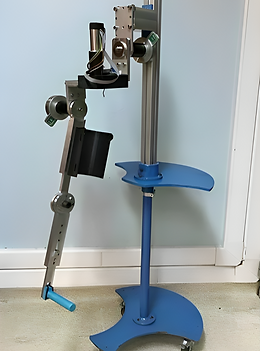
Rehabilitation Robotics
"EMG-Driven Impedance Control for Post-Stroke Upper-Limb Rehabilitation"
Role: Undergraduate Research Assistant and Team Leader
I led the design and development of a 4-DOF EMG-driven upper-limb exoskeleton for post-stroke rehabilitation, focusing on how impedance control can be adapted in real time to support safe, intuitive physical human–robot interaction across multiple therapy modalities. The system was developed in close collaboration with physiotherapists and supports passive, isometric, isotonic, and active-assistive training, enabling structured rehabilitation while preserving user agency during assisted motion.


At the control level, I implemented force- and EMG-modulated impedance control to regulate joint-level assistance based on inferred user intent and interaction forces. A custom, low-cost EMG acquisition and processing pipeline was designed and integrated with MATLAB/Simulink-based control, enabling continuous muscle activation estimation and online impedance tuning. By coupling EMG signals with joint torque feedback, the system reduced intent-to-torque latency by 18%, improving responsiveness and transparency during assistive interaction.
The exoskeleton achieved 95% joint trajectory fidelity across rehabilitation modes, demonstrating stable and repeatable assistance during bench-top and simulation-based validation. The mechanically grounded, anthropometrically adjustable design ensured safe operation across a wide user population while maintaining consistent impedance behavior. This project established an early foundation for human-in-the-loop rehabilitation robotics, where sensing, control, and embodiment are co-designed to support adaptive motor assistance rather than rigid trajectory enforcement.
Research Outputs:
Publications:
1. Karadeniz, F., Aydogan, O. E., Kazanci, E. A., & Akdogan, E. (2020). Design of a 4-DOF grounded exoskeletal robot for shoulder and elbow rehabilitation. Sustainable Engineering and Innovation, 2(1), 41-65, cited by 6
Competition Awards:
1. 1st Prize, TEKNOFEST Aerospace and Technology Festival 2020, Technology for Humanity Competition, Health and First Aid Category (Undergraduate and Graduate Level), Sept. 2020
2. 2nd Prize, TUBITAK 2242 University Students Research Projects Competitions, Health Category, Sept. 2020
3. 1st Prize, 8th University Students Research Project Competitions, Istanbul-Asian Region, Health Category, Aug. 2020
Invited Talks:
1. You Wear It Well Podcast: The role of mechatronics in the future of rehabilitation robotics, May 2021
2. Yildiz 1911 Podcast: Development of an upper limb exoskeletal rehabilitation robot, Oct. 2020
Press Coverage:
1. "Teknofest’in ‘yildiz’lari icatlarini anlatti" ("Teknofest's 'Stars' Discuss Their Inventions"), Hurriyet Newspaper, Oct. 9, 2020
Research Support:
Research Grants:
1. TUBITAK 2209-B Industry-Oriented Research Projects Grant (3,957 Turkish Lira), The Scientific and Technological Research Council of Turkey (TUBITAK) Directorate of Science Fellowships and Grant Programs (BIDEB), Grant No: 1139B411900912, Jan. – Dec. 2020
2. TEKNOFEST 2020 Technology for Humanity Competition Grant (1,500 Turkish Lira), Turkish Technology Team Foundation, July – Sept. 2020